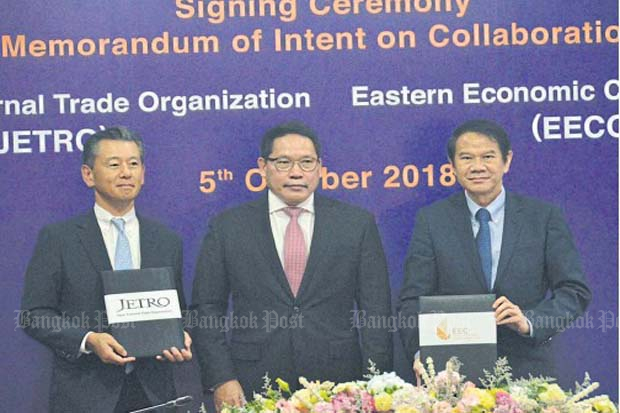
Thailand and Japan have come to an agreement to aid Japanese companies looking to invest in the government’s flagship Eastern Economic Corridor (EEC) scheme.
Industry Minister Uttama Savanayana yesterday witnessed the signing ceremony of a memorandum of intent between the EEC Office and the Japan External Trade Organization (Jetro).
Both parties will collaborate to promote investment in Japanese companies throughout the EEC host provinces of Chachoengsao, Chon Buri and Rayong.
The corridor will focus on 11 targeted industries: cars; smart electronics; affluent, medical and wellness tourism; agriculture and biotechnology; food; robotics for industry; logistics and aviation; biofuels and biochemicals; digital; medical services; and defence.
Japanese companies lean heavily towards automotive, electronics, medical equipment, aerospace and food.
Mr Uttama said the government is speeding up many infrastructure projects in the EEC scheme to support future investment flows and build up investor confidence from local and foreign companies.
“The Thai government and Jetro have strong relationships with many collaborators, and the new one is expected to see actual outcomes in 2019,” he said.
Both parties will also establish the Thai-Mie innovation centre in Bangkok to promote the food sector and support small and medium-sized enterprises’ agricultural products.
Mr Uttama said Jetro will bring Japanese companies from Mie prefecture to visit the EEC.
“The companies from Mie are interested in investing in the food industry, so this centre will improve Thai SME efficiency and increase value-added agricultural products,” he said.
Kanit Sangsubhan, secretary-general of the EEC Office, said both parties will carry out many activities through the collaboration and cooperate with each other, including by sharing information that will be provided to Japanese investors for new investment expansion in Thailand.
The Thai government expects to gain technological know-how in higher technology and innovation from Japanese counterparts.
Jetro also reported that the registered capital value for companies in the EEC provinces is being led by Japan, representing 53% of total registered capital or 363.95 billion baht as of June.
China came second with 41.53 billion baht, accounting for 6%.
Singapore and the US were ranked third and fourth with 28.9 billion and 26.91 billion baht, respectively.
Jetro also cited Board of Investment (BoI) data from 2017 to March 2018 that showed Japanese investors making up the better part with 97.39 billion baht, representing 49% of total applications.
European companies submitted BoI applications worth 23.63 billion baht, accounting for 12%, in the same period, while Singapore was ranked third with 20.36 billion baht, making up 10% of total applications.
Hiroki Mitsumata, Jetro’s president and chief representative for Asean, said many Japanese companies have already entered EEC provinces after many positive signs that the Thai government is keen on the corridor scheme.
Jetro has 1,016 companies in the EEC provinces out of a total of 5,400 companies registered in Thailand.